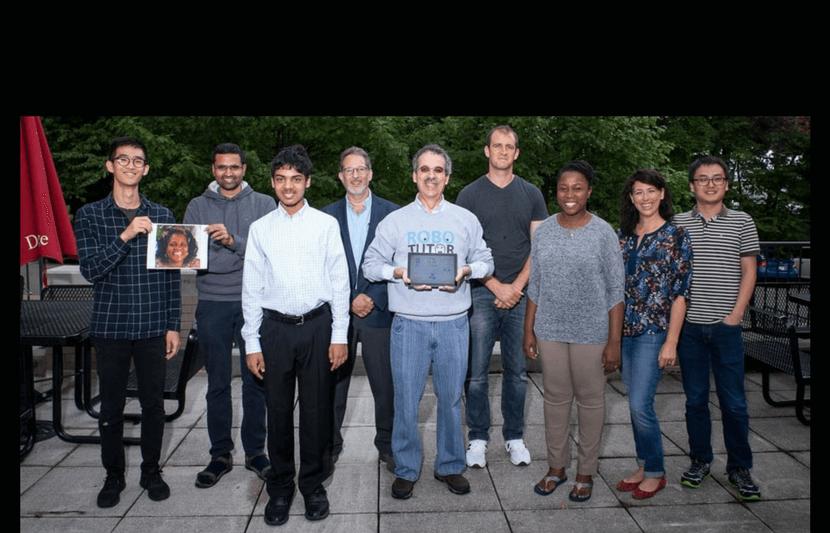Led by Professor Jack Mostow, professor emeritus in the School of Computer Science‘s Robotics Institute at Carnegie Mellon University (CMU), the RoboTutor LLC team recently won $1 million as a Global Learning XPRIZE finalist for its educational technology. The software, aptly named RoboTutor, is designed to teach young children, between 7 and 9 years of age, basic math and reading without help from an adult.
RoboTutor LLC is a Carnegie Mellon spinoff company created by Mostow, which used certain CMU licensed technology to enter the competition.
Almost 200 teams from 40 different countries entered the competition. The RoboTutor team is one of five finalists, who are now competing to win the XPRIZE grand prize of $10 million.
To win the grand prize, the five finalists must show that their app has the highest learning gains over 15 months of testing children in nearly 200 Tanzanian villages. XPRIZE will select the winner based on its own independent study of the children’s gains in basic math and reading during that time period.
It is estimated that nearly 250 million worldwide lack basic reading, writing and arithmetic skills, largely due to a shortage of teachers in developing countries. The goal of the competition is thus to “empower children to take control of their own learning.” To do this, XPRIZE created an international competition to challenge teams to create open-source Android tablet apps, in both English and Swahili, that would give children between the ages of 7 and 9 in developing countries the resources to teach themselves basic reading, writing, and arithmetic.
The RoboTutor team met this challenge, and will now have their app tested on the field. “We hope to demonstrate how to achieve dramatic learning gains by building on solid scientific foundations, harnessing advanced technologies, and using educational data mining to guide iterative refinement,” said Mostow.
The RoboTutor software is built on decades of research, including Mostow’s Project LISTEN. That project involved a Reading Tutor that helped children with their reading. Essentially, children would use the Reading Tutor to learn to read by listening as they read aloud. The Reading Tutor would correct any mistakes made, help the children with difficult words, and assess their progress.
The RoboTutor software is designed to “engage students so that they learn the material and can then use it in other contexts.” To accomplish this, it “sends back copious data in the form of log files, screen capture video, audio, screen touches, and children’s automatically recognized facial expressions,” Mostow said. The data it collects from various interactions with children allows the software to adapt to an individual student’s needs while continuously refining its design and functionality.
Learning is driven through activities involving reading and writing, numbers and math, and comprehension and shapes. The software is unique in that the “data-driven design process” helps it adapt to local cultures.
RoboTutor’s success is largely thanks to Mostow, whose parents always encouraged him to “make a contribution” in life. His inspiration dates back to 1990.
“In 1990 I asked my parents the fateful, ‘If you wanted computers to teach something, what should they teach?’ My father, a mathematician, said ‘Math!’ but my mother, an English major, said ‘Reading!’ and suddenly everything clicked — get computers to listen to children read aloud,” Mostow said.
Thus began a quarter of a century worth of work, adding writing and math to his list along the way, all leading to this competition. “The Global Learning XPRIZE is the culmination of my life’s work – the opportunity of a lifetime to help millions or even billions of children get a basic education, helped by an amazing team of brilliant, dedicated volunteers eager to apply their considerable talents to RoboTutor,” said Mostow.
The RoboTutor team is made up of over 100 CMU students and faculty and other students and experts, including CMU’s Amy Ogan, assistant professor in the Human-Computer Interaction Institute (HCII), and Judith Uchidiuno, a doctoral student in HCII; Leonora Kivuva, an instructor in the University of Pittsburgh’s African Studies Program; and 15 year-old Vishnu Rajan Tejus, RoboTutor’s chief technology officer, who was the first to join the team.
Mostow is reluctant to count his “megabucks before they hatch,” but “whichever team wins, I hope that the Global Learning XPRIZE will succeed spectacularly at showing how affordable technology can provide effective basic education to the millions of children in developing countries who have little or no access to schools,” he said.
Mostow hopes his app model “will be replicated and adapted for other countries, languages, and cultures.”



